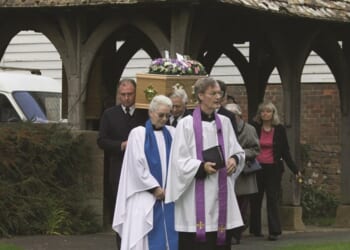I FIRST met Keith Ward at a Society for the Study of Theology conference in Durham, 55 years ago. His penetrating intelligence, curiosity, and energy were immediately obvious. We both enjoyed arguing, and, for a while, he referred to me teasingly as “the curate from Rugby”. I remain a fan. As a youthful atheist, he had trained in science and philosophy, but not in theology, and yet he has had a stellar career as an academic theologian and Anglican priest, concluding with the Regius Chair in Divinity at Oxford.
Like his mentors, Plato, Hume, Kant, and Bishop Berkeley, Ward prefers, refreshingly, to think for himself rather than to quote (or, perhaps, even read) extensive secondary sources. This has annoyed biblical scholars and sociologists of religion alike. In the current issue of Theology, even the eirenic David Fergusson’s astute review of his latest (polemical) book, Karl Barth on Religion: A critique (CUP, 2024; Books, 18 July), notes five distinguished Barthian scholars whom he fails to mention. Ward’s self-directedness may, however, be a crucial part of his deeply inspiring theological creativity.
Ian Markham, Dean and President of Virginia Theological Seminary, is also a fan. Together with a research student at his seminary, he has persuaded seven sympathetic philosophical theologians to provide accounts of Ward’s key ideas about personal idealism, faith, hope, love, pedagogy, mind, and comparative theology; and Ward responds briefly and enthusiastically to each. The result is a rich dialogue rather than the rather dreary-sounding “research seminar textbook” of this book’s sub-sub-title.
One of the problems that each contributor faces is that Ward’s writings in some 51 books are already highly accessible and do not really require others to summarise them. For example, his My Theology: Personal idealism (DLT, 2021; Books, 25 February 2022) offers a masterly account in just 95 pages.
The other problem is that only Philip Clayton, a doyen of Claremont School of Theology, offers a telling critique. Most of the others simply agree with Ward (as I am tempted to do). Clayton, though, questions whether Ward really does derive his understanding of God as Universal Mind initially from philosophy rather than also from Christian revelation, since Ward admits that an elusive personal encounter with Christ (together with a growing discontent with the British analytic philosophy in which he had been trained) spurred his break from atheism. It is well worth buying the book just for this particular exchange.
Andrew M. Davis is also at Claremont and writes well, but less critically, on Ward’s understanding of personal idealism, which maintains that minds (human and divine) can exist independently of physical bodies (affecting an understanding of eternal life, of resurrection, and of God). The distinguished Georgetown University professor Peter Phan, in addition, extols Ward’s comparative theology from a Roman Catholic perspective. He is convinced that Ward adds significantly to John Hick’s triad — exclusive, inclusive, and pluralist approaches to other religious traditions — by suggesting an additional and very Anglican and progressive Catholic approach, based on a general commitment to a particular faith while holding that one can expand (and sometimes correct) one’s own faith by insights from other traditions. David Brown’s Learning from Other Religions (CUP, 2023) has suggested something very similar.
There is much to celebrate and enjoy here about the stimulating and wide-ranging writings of Keith Ward, now well into his eighties but as sharp as ever.
Canon Robin Gill is Emeritus Professor of Applied Theology at the University of Kent.
God and Faith: Thinking about God with Keith Ward: A research seminar textbook
Ian S. Markham and J. D. Bauman, editors
Pickwick Publications £21
(979-8-3852-2029-8)
Church Times Bookshop £18.90

















